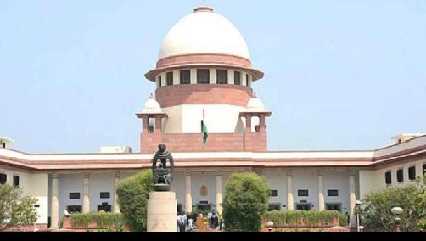
New Delhi, 12 May 2022 (UMMN): A special bench of Supreme Court has stayed all pending criminal trials and court proceedings under Section 124A (sedition) cases and directed the Centre and states not to register any fresh FIRs on sedition charges until the government revisits the colonial-era law.
A SC bench comprising Chief Justice NV Ramana, Justice Surya Kant and Justice Hima Kohli on Tuesday said that all pending cases, appeals and proceedings in respect of the charges framed under Section 124A (sedition) should be stayed.
As per the report of Live Law, the bench said, “We expect the Central and State Governments to refrain from registering any FIR, continuing the investigation or taking coercive steps under Section 124A of the IPC, unless It is subject to reconsideration. It would be appropriate that this provision of law should not be used till its review.
The bench said those who have been convicted in sedition cases and are presently in jail can approach the appropriate court for bail.
The bench asked the Center to clarify within 24 hours its views on the issue of protecting the interests of citizens till the colonial-era law on sedition is reconsidered by an appropriate forum.
The top court is hearing various petitions challenging the constitutionality of the sedition law. The sedition law has been at the center of controversy amid allegations that it is being used as a weapon by various governments to settle political enmity.
Agreeing to examine petitions by the Editors Guild of India, former Major General SG Wombatkere and Trinamool Congress MP Mahua Moitra challenging the constitutionality of Section 124A (sedition) of the IPC, the top court had said its main concern was ‘misuse’. ‘, due to which the number of cases is increasing.
Any speech or expression under this Act with non-bailable provisions which seeks to promote hatred or contempt or dissatisfaction with the Government established by law in India is an offense punishable with maximum punishment. may extend to life imprisonment.
Four former judges had said the death of tribal rights activist Stan Swamy was an example of how the country’s anti-terror law was being misused. The unconstitutional interpretation of the UAPA takes away the fundamental right to life, personal liberty and the right to speedy trial, guaranteed under the Constitution.
According to the report, the court’s decision on Wednesday is significant as opposition leaders alleged that the so-called ‘review’ of the law was a way for the government to avoid the Supreme Court case and continue to use the law in the meantime.
The Modi government at the Center had on May 7 defended the punitive law related to sedition (Section 124A of the IPC) in the Supreme Court and a 1962 decision of the Constitution Bench to uphold its validity. The Center said that this law has been in place for almost six decades and instances of its misuse can never be a reason for its reconsideration.
Concerned over the rampant misuse of the penal law on sedition, the apex court had in July last year asked the Center why it was not nullifying the provision used by the British to silence people like Mahatma Gandhi to suppress the freedom movement. .
These allegations had prompted the CJI to ask whether this colonial-era law used to suppress freedom fighters was still needed 75 years after independence.




